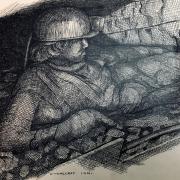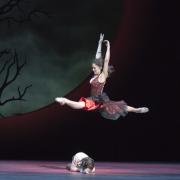Discover the delights of the Dee where salmon and trout bring joy to the jolly fishers of Llangollen, Corwen and Bala
WORDS BY PATRICK O'NEILL
PHOTOGRAPHY BY JOHN COCKS
Click the picture on the right to start playing the audio
This recording is courtesy of Sandbach and District Talking Newspaper service
From a state-of-the-art digital studio in Sandbach, about 100 visually impaired listeners are served every week, but Sandbach TN is actively trying to increase the number of its listeners and also to reach others who perhaps suffer a disability which makes reading a strain.
For more information please look at the charity's website, www.talkingnews.org.uk, or call Pam on 01606 833408
It’s our best-kept secret. An epic tale ignored by the shoals of tourists who cross the bridges and picnic by the banks of the River Dee, where one man and his rod stand in silent witness to a drama that is older than Wales.Forget the joys of camping, climbing, sailing and swimming, wining and dining, familiar to generations of holidaymakers. And consider hunting the silver salmon. As the fishermen's motto says: 'A bad day of fishing is still better than a good day at the office.' With angling associations at Llangollen and Corwen, professional instructors across the area, tackle shops ready with rod and line and fishing holidays available via the North Wales tourist organisations, there is no time better than now to follow Bing Crosby's advice: 'Gone fishing, is better than just wishing.'So let's start with the Dee salmon. They battle across the raging Atlantic, navigate Wirral estuary marshes, surge by the city walls in Chester, glide through the rustic glades of Overton and Erbistock. They hasten past the racecourse at Bangor, leap through the picturesque vale of Llangollen, meander the broad acres of Corwen and Bala to swim the pools, falls and rapids of Snowdonia. Over gravel and clay, bedrock and boulder they journey thousands of miles to return miraculously to the place of their birth. There they lay their eggs, leaving the next generation to repeat an epic trek generations have taken before. For advice I went to Gwilym Hughes of Corwen, author of The Angle of the Cast, a qualified instructor who guides anglers on an individual or group basis. How best to start? 'Take qualified instruction. You'll learn more in a day than in week just messing about on the river. And also add the merits of trout and grayling to your fishing ambitions,’ he said.Sound advice. Gwilym is vice president of the Game Angling Instructors Association, winner of numerous competitions and has represented Wales in World Championship matches. Interestingly Gwilym also coached the Welsh Ladies International team for four years. ‘Women anglers bring a new dimension, because women see angling as much an art form as a sport. One of the myths is that fly-fishing requires great strength.’ According to one expert:'Fly-fishing requires timing, not strength. Women are easier to teach than men because they seldom over-power the cast.'The next things to learn about are flies: mayflies, caddisflies and stoneflies. Mayfly are so called because, though this group of 51 British species can appear at any time of the year, one 'ephemera danica' emerges when the hawthorn or Mayflower is in bloom. Older than the dinosaurs, they were among the first winged insects dating back 300 million years, a species ancient as an angler's joke: 'The funeral passed over Llangollen bridge where Dai was fishing. He took his hat off and put it over his heart. When his friend complimented Dai on his sensitivity, he replied: “It's the least I could do, I was married to her for 30 years.”Here the mystery deepens, because fish are caught by using 'artificial' flies created by tying hair, fur, feathers, or other materials, both natural and synthetic. The flies are tied in sizes, colours and patterns to mimic local insects, or other prey attractive to the fish.Yet not all is perfect in paradise as Gwilym Hughes points out. Vigilance is needed along the 70 dangerous miles from Irish Sea to Snowdonian source. (Threats include pollution, poaching and illegal canoeing.) Top of the list perhaps is pollution. The danger comes from water with high nutrient levels run off from farmland. Excess nutrients can also lead to growths of algae, which smother vegetation and reduce oxygen levels making unfavourable conditions for river flies. Toxic insecticides are also dangerous.But the bonus is not just that the salmon is the fisherman's friend: like the fly it also acts as a litmus test to water purity. Clean water benefits birds, insects and other life from kingfishers to voles. And from mayflies to men.There is one more bonus. Nothing tastes more perfect than wild Dee salmon which are 'firm and lean'. Farm-raised fish by contrast are as 'flabby as a couch potato' from lack of exercise.So take to the Dee and become firm and lean in pursuit of the king of game fish. Or as it is known in Celtic mythology 'the salmon of wisdom.'


























